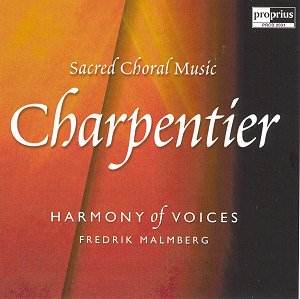Charpentier had quite a long career as a composer,
from about 1670 to his death in 1704. During this time his was
famously excluded from areas of Royal patronage by Lully, but
Charpentier wrote for a number of important patrons including
the Duchess de Guise and the Dauphin. This lower profile meant
that he was perhaps freer to experiment than he might have been
if he had been constrained by the restrictions of working for
the Royal court. His centenary this year means that we are getting
the opportunity to hear a greater variety of his music recorded
on CD. This current one is from a young Swedish choir, comprising
just 14 professional singers; they have been chosen as the Swedish
Broadcasting Corporation’s artists in residence for 2004/2005.
In the 1660s Charpentier spent several years
studying in Rome with Carissimi. In his motet Salve Regina
à trios choeurs Charpentier gives a masterly demonstration
of his understanding of the Italian style of composing for multiple
choirs; in this case two choirs of mixed voices and one choir
of men’s voices. Following an introduction based on the
relevant plainchant, Charpentier sets the text as an ardent prayer
to the Virgin for her help and supplication. Harmony of Voices
makes a lovely clean sound with great attention to individual
lines; each voice is given great clarity. The resulting chamber
music feel is to their great credit. The choir use French baroque
pronunciation, but their clarity and cleanliness of sound mean
that they bring a welcome whiff of Northern air to the music.
Malmberg seems to favour steady tempi. His version of the motet
is longer than Jeffrey Skidmore’s recording with Ex Cathedra.
But this does not mean that Malmberg is self indulgent, more that
the slightly slower tempi reinforce the neo-classical purity and
clarity of the performance. Skidmore’s group, on the other
hand, give this motet a rather larger scale, choral performance
which is just as thrilling in its own way.
Where required, the soloists in the motets are
drawn from the choir which means that we get a subtle variety
of style as the soloists vary. In Beatus Vir some solo
passages, at the works in saeculum saeculi for instance, the singer’s
passage work is a little smudged which rather detracts from the
overall pristine feel of the performance. Also in Beatus Vir the
choir indulge in some rather unsuccessful, odd ornamentation when
the works speak of gnashing of teeth.
Le Reniement de St. Pierre is one of
Charpentier’s 35 oratorios. It dramatises St. Peter’s
three fold denial of Jesus, beginning with the Last Supper and
ending with Peter’s bitter tears. It is a lovely work and
it receives a beautifully rich and subtle performance from Harmony
of Voices. The use of a relatively small group of singers means
that there is less contrast between the choral and solo passages.
As in the comparison with the Stabat Mater this gives the piece
a welcome chamber feel; whereas Jeffrey Skidmore and Ex Cathedra
give a fine performance in a more choral manner.
Charpentier’s Stabat Mater was
written for the nuns of Port Royal. Performed fully, it consists
of 20 verses sung alternately by soloist and choir of women’s
voices. Harmony of Voices give a suave performance of 10 verses,
but include men’s voices which I think deprives the work
of the hypnotic quality it would have had when the nuns performed
it. Rather than one of his larger scale settings, Harmony of Voices
perform a small scale setting of the Te Deum which was
probably written for a service. They conclude with a long, reflective
motet Transfige dulcissime Jesu which was written to be performed
at the elevation.
This is an attractive programme of Charpentier’s
smaller scale works performed with stunning clarity by a talented
new Swedish ensemble. Two of the pieces (Salve Regina
and Le Reniement de Saint Pierre) are common to both
this disc and that of Ex Cathedra under Jeffrey Skidmore. But
Ex Cathedra’s programme includes the Mass for 4 Choirs
and the Salut de veille des ‘O’ so that in
an ideal world one should possess both discs.
Robert Hugill


